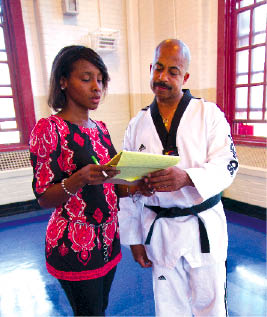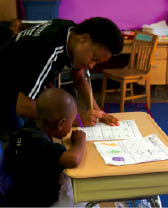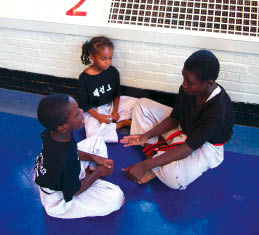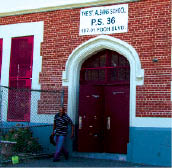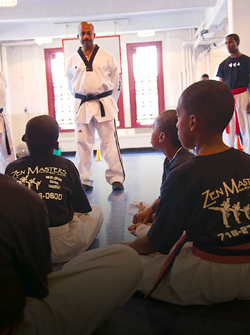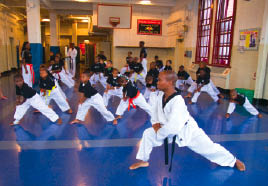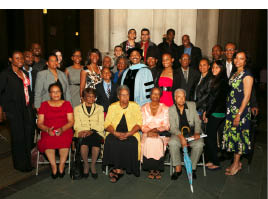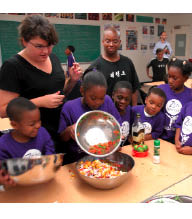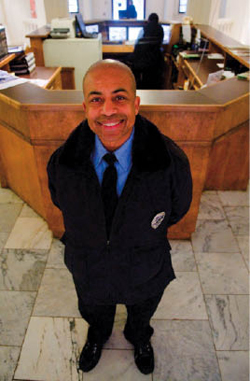Master Dennis
TC security officer Dennis Chambers (Ed.D.,'10; M.A.,'02; M.A.,'99) helps young people take control of their lives
TC security officer Dennis Chambers (Ed.D.,’10; M.A.,’02; M.A.,’99) helps young people take control of their lives
by Joe Levine
Growing up in a tough section of Queens, Edwin Victor had a lot to be angry about. He was small, and other kids picked on him. With no father in the picture, he felt pressure to be “the man of the house.” His school had labeled him a special education student—a designation that shamed and bewildered him. As a result, from the time he was 11 through high school, Victor got into fights nearly every day.
Along the way, though, Victor’s mother enrolled him in Zen Masters, a martial arts-themed after-school program run by Dennis Chambers, a Teachers College security officer, and his wife, Sharon. The program emphasizes discipline, respect and the use of violence only as a last resort. Dennis Chambers personally took Edwin Victor in hand, chasing him down when he cut school, chewing him out when he got out of line, and meeting with Edwin and his mother when he didn’t do his homework. Gradually, Edwin Victor stopped fighting. Today, at 29, he’s earning an associate’s degree and working as an instructor for Zen Masters. He’s thinking about opening up a martial arts program of his own.
“Master Dennis has been like a second father to me,” he said one day this past August, referring to Chambers by his Zen Masters title. “If he hadn’t put me in line, who knows where I’d have ended up—doing bad things, causing my family pain.” He gestured at the rows of kids in white uniforms working out on the gym floor at P.S. 36, in the Jamaica St. Albans section of Queens, where Zen Masters holds its summer camp. “He also gave me the patience to teach. Those are my proudest moments, when we do the promotional exams, and I see the kids give their all in front of the parents. Their achievement is mine, and mine is Dennis and Sharon’s.”
Perception and Reality
Meeting Dennis Chambers on the job at TC, you might not picture him barking commands at a room full of rapt disciples. A gentle man with a welcoming smile and voice with a faint West Indies lilt, he doesn’t announce his physical prowess—or his many other impressive accomplishments. These include two master’s degrees from Teachers College —one in health education, another in organizational psychology—as well as a certificate from TC’s International Center for Cooperation and Conflict Resolution. The latter credential has enabled him to work with employees at the United Nations and at Head Start programs in Atlanta and Boston. He also has taught at Brooklyn College and given motivational talks to community organizations.
And then there’s the TC doctorate he received this past spring in adult learning—a milestone not only for Chambers, but also for the extraordinarily wide range of people at TC who have rooted him on.
For Chambers, it’s all an extension of the kind of work he did with Edwin Victor: helping people take control so they can see the possibilities for what they can become.
“Dennis is a genuine humanitarian,” says Maria Volpe, Adjunct Professor of Adult Learning and Leadership, who served as his thesis advisor. “He really cares about people who are less fortunate—the kids everyone else would give up on—because he knows what it’s like to struggle and be poor. He pursued a doctorate not as a measure of personal achievement, but instead, as a way of saying that behind his practice is a theoretical base that makes it more informed and substantive.”
Certainly Chambers knows what his accomplishments symbolize. As with his two previous degrees, he brought a contingent of Zen Masters students to his doctoral hooding in May at the Cathedral of St. John the Divine.
“I wanted that to be a lasting image for them, because too often African American males have to fight negative stereotypes of what it means to be studious, and some actually dumb themselves down as a result,” he told me last spring. “So I really wanted to signify, ‘Hey, it’s okay to study, to do well.’”
It’s a message that needs reinforcing on multiple fronts.
“Oftentimes the kids I work with tell me they have a difficult experience or relationship with teachers, that a teacher is out to get them. And I don’t know the teacher, I don’t know what the experience is, but I can try to help them with their skills in managing the relationship with that teacher. How to approach the teacher, how to ask questions, how to try and find a resolution. Because with young students, if they don’t feel the teacher has their best interests at heart, that can flow into how they view the subject matter. You know—‘I hate science, because that teacher doesn’t like me.’”
Chambers believes that adult black men in academia fight the same battles. For his thesis, he conducted in-depth interviews with 15 African American male doctoral students about their encounters with what the psychologist Claude Steele calls “stereotype threat”—the potentially damaging ways that those in minority groups are often seen by others because of their race, gender and social class.
“The research says that faculty mentorship is particularly important to black men, but often they don’t feel supported or prepared by their advisor,” he says. “They don’t feel they have forged a relationship with their advisor that’s productive, because the advisor may see them in stereotypical ways —or it maybe they only think that, but at a certain point perception becomes reality.”
As a security guard working at the same institution where he pursued his studies, Chambers, too, has encountered stereotype threat. Not long after 9/11, he showed up for a course still in uniform, and a student said, “Are we going to have security with us everywhere now?” Another time a woman applying for a high-level administrative job at TC treated him rudely at the front desk, only to encounter him later that same day as a member of the search committee that was interviewing her.
“When I started asking her questions, I could see and feel her regret about how she had interacted with me,” he recalls. “You just never know who you’re dealing with. It’s so important to treat everyone the same, and to honor each other. I would hope she really learned something from it.”
Making the journey
Chambers grew up in a home where there was a high regard for education. His father was a teacher before bringing the family to the United States in the early 1970s, when Dennis was 10, and he later earned a degree in economics. Chambers’ godmother and an aunt were also teachers, and his mother was a nurse.
Yet, Chambers, too, got into fights and did poorly in school, just like Edwin Victor. He, too, was enrolled by his parents in a martial arts program—one that taught the Korean form of karate called Tae Kwon Do.
“One of the kids that had been bullying me was in the program, and it became my undying wish to beat this kid,” he recalls, with a wry laugh. “It was around the Olympics, and I used to train like I was training for the Olympics. And subsequently, the young man just kind of stopped, and I was left with no one to beat. But then I started to realize, ‘Wait a minute, I’m not that bad, you know?’ And meanwhile, I was being placed in a leadership role in the program, and that really stabilized me.”
Chambers ended up attending St. John’s University, and in 1989, he took a security job at TC.
“All I knew was that I wanted to pursue my dream of getting a master’s in education, but I wasn’t sure what to focus on.”
It was five years before he took classes, and by then he and two friends from high school had started the martial arts program he would later take solo as Zen Masters. He studied health education, focusing on exercise physiology, but soon realized he needed other skills to run the program.
“I was facing a lot of behavioral issues with the young people I was working with, and I saw that if I really wanted to impact this whole person, this whole child, I needed to have an effect in other aspects of their lives.”
He has since worked with many TC faculty members in different departments, but particularly credits Volpe; Victoria Marsick, a professor in the department of organization and leadership; and Barbara Wallace, Professor of Health Education, with giving him the confidence to do the work.
“It was easy to believe in Dennis because Dennis, in his soul, believes in himself,” says Marsick. “He values education, and he values making a difference, and those values hark back to his own family upbringing. The topic he ultimately chose for his dissertation echoes his own journey and is a beacon of light for other black men undertaking the same journey.”
At the same time, Chambers says, he’s gotten as much or more from his informal interactions at TC.
“My learning takes place traveling the halls and in the offline conversations that I have,” he says. “Because everyone has something to teach.”
In the mid-’90s, for example, Chambers struck up a friendship with Ennis Cosby, the comedian’s son, who was working on a degree at TC. The younger Cosby, who was later killed in a shooting in Los Angeles, wanted to start a school of his own. He gave Chambers a copy of the book Emotional Intelligence, by former New York Times reporter Daniel Goleman. Chambers ended up using the notion of emotional intelligence—a quality that includes the ability to successfully interact with others based on an accurate sense of oneself—as a key measurement in his thesis.
Chambers has also been tapped for roles in various communitywide efforts at the College. In 1994, he spoke at the inauguration of Arthur Levine, the College’s ninth president. “Initially, I didn’t want to do it, because I have a fear of public speaking,” he says. “But then I began thinking about a student I was working with on martial arts. She was having difficulty doing a high leg kick —she had jumped and tried to do the kick and started crying. And I had said to her, ‘You’ve got to stand up and face your fears and try again.’ And she kept working on it, and she got better at it. And I thought, ‘Wow, here I am making this speech to this young girl, and I’m not following that.’ So the very next day, I said I would speak at the inauguration. I spent some time in a room, practicing at a podium. And afterward, I was very happy that I did it.”
In 2000, Chambers, together with Peter Coleman, now Associate Professor of Psychology and Education, and ICCCR Director, co-chaired a committee that, among other things, created TC’s Office of Diversity and Community and initiated coaching sessions on tolerance and respect.
“It was a time of crisis at the College that was triggered by some inappropriate remarks made at a faculty meeting but soon escalated through emails and messages sent by people to the TC community and even board members that surfaced broader concerns,” Coleman recalls. “Art Levine, who was president, asked me to lead a taskforce. I was nervous about it because I was young, untenured and white, and these were issues with a lot of contentiousness, with some of the most agitated members of the College on the task force.”
When Coleman expressed those fears at the first task force meeting, someone suggested naming a co-chair. Someone else nominated Chambers, who was active in union and security staff leadership, and there was immediate agreement.
“He was a great co-chair,” Coleman says. “It was a very challenging committee, very contentious, and I was a
lightning rod for a lot of frustration and animosity. Dennis was skillful, smart, wise, and he helped me maintain perspective throughout the process, which was not always easy to do. The committee met eight or nine times over a very long, hot summer, and each time I knew I was looking at two hours of being the bad guy. Dennis didn’t vilify me, and he gave me the space to manage what I needed to do.”
Chambers’ training through ICCCR to look for shared goals was one asset he brought to the table. But Coleman, who had helped to teach him some of those skills, thinks Chambers’ martial arts background and his natural disposition to interact with many different kinds of people were even more important.
“In our parlance, he’s an integrative agent, a multiple-identity being,” Coleman says. “He’s a security officer, a union member, a black man, a student, and he’s also spent time with the president, the provost and the deans—so he has relationships in all these different pockets of the College, and he’s able to see multiple perspectives and bring them into the conversation. And he doesn’t polarize. He stays in the middle, which is really important when there’s conflict. Also, people who study martial arts often have a certain confidence, perhaps because they have these weapons but don’t need to use them. Dennis has such equanimity—a friendliness and peacefulness, but also a seriousness in everything he does. All these combine to give him authority and respect.”
Somehow, amid all his TC responsibilities, Chambers was still driving home to Queens every evening, jumping into his Tae Kwon Do uniform, and teaching a room full of kids.
“Sometimes, on the way home, I’d have to just pull over for a moment and switch worlds, so I could be together for the kids,” he says. “That was the biggest challenge.”
Still, he brought a lot of TC with him. Zen Masters is set up as a learning community. In addition to the adult instructors, older and more advanced kids teach those who are not as far along. After calisthenics and drills, it’s not uncommon to see 10-year-olds talking to pairs of smaller children about martial arts techniques and etiquette and quizzing them on the four Zen Masters rules (obey the instructor; address higher ranking belts as “sir” or “ma’am;” no conversation while training; no smoking, drinking or drugs) and the definitions to key words and concepts (Tae Kwon Do; instructor; master).
The program, now with its own office and full-time staff, has grown over the years. At the summer camp, a typical week includes chess instruction, math review, dance and drumming. For science, a local physician comes in to lead animal dissections. A school psychologist leads rap sessions on topics such as how to make and keep friends. The program, which is accredited by the City, provides academic assistance in consultation with children’s teachers at school.
Still, Zen Masters feels like a family. Sharon Chambers is now the full-time business manager after working for many years in corporate human resources. She also teaches chess and mentors several young staff members who want to open their own businesses. Both of the Chambers’ daughters—Brittany, now at Northwestern University, and Ashley, who entered The New School this fall as a music student —are black belts who have taught in the program, and Kyle Chambers, a sixth grader, is a red belt.
All of them address Dennis Chambers as “Master Dennis” in the program, and Kyle addresses his sisters as “ma’am.”
“I’ve been working at the summer camp since I was eleven,” Ashley Chambers says. “I’ve always called my parents ‘Master Dennis’ and ‘Mrs. Chambers’ on the job. People who are new ask, ‘Why don’t you call them Mom and Dad?’, and I tell them, ‘Because it would be unprofessional.’” The discipline of martial arts has helped her with her music, she says, and she intends to keep practicing the sport as long as Zen Masters continues to exist. Of her father, she says, simply, “We all look up to him. He’s my role model.”
Running Zen Masters, working a full-time job and being a student could have strained his home life, but Chambers says his family has rallied around him.
“There’s always been a sense that I’ve been doing this not just for me, and so everyone has made sacrifices to make it happen,” he says. “That’s brought us closer together.”
There have been longer-term payoffs as well.
“People talk about ‘the village,’ and my program is an extension of that village,” he says. “I try to help parents because the challenge of maintaining the village has become very difficult. People are working more, and families are more fragmented. I want to place my own children into a larger community where they can be successful and have good relationships. So I have a responsibility to help create that larger community.”
After the pomp and circumstance
When Chambers walked down the aisle of St. John’s in May, his relatives, friends and students were there to cheer him on. TC President Susan Fuhrman told his story, in brief, and the entire church erupted in applause.
If life were a movie, it would fade to black there, with Chambers smiling and posing for pictures in his cap and gown. Instead, he was back on shift at TC the following Monday—and back leading the Zen Masters summer camp shortly thereafter.
“I’m not sure what I’m going to do next,” he said a few days after convocation. “Everyone’s been curious, and I appreciate that. But I need to think about how I can use all my parts, and all the things I’ve learned, to realize my passions and dreams.”
He’s had inquiries from both community and charter schools that want to tap his expertise to boost their students’ performance. He’s considering other options, as well.
“One thing that limits people is not having a clear path,” he says. “But as a friend of mine says, it’s never too late to be who you want to be. And oftentimes if you enter the path, the path itself will lead you. Never in my wildest dreams did I think I would be teaching martial arts or leading an after-school program. But that’s where my journey took me, and it’s enabled me to define happiness as being what I have to offer others.” He laughs. “The other day, I told someone that teaching is just a different form of love, and they looked at me kind of strangely. But if people know you care, it makes a difference. So I think teaching will always be at the core of what I do.”
To view a videotaped interview with Chambers, visit: www.tc.edu/news/7519.
Published Wednesday, Dec. 15, 2010
